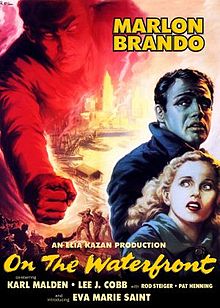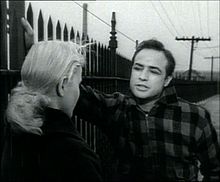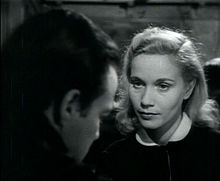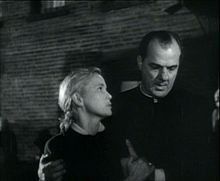- On the Waterfront
-
On the Waterfront 
Theatrical release posterDirected by Elia Kazan Produced by Sam Spiegel Written by Budd Schulberg Starring Marlon Brando
Rod Steiger
Lee J. Cobb
Eva Marie Saint
Karl MaldenMusic by Leonard Bernstein Cinematography Boris Kaufman, ASC Editing by Gene Milford Distributed by Columbia Pictures Release date(s) July 28, 1954 Running time 108 minutes Country United States Language English Budget $910,000 (est.) Box office $9,600,000 On the Waterfront is a 1954 American drama film about union violence and corruption among longshoremen. The film was directed by Elia Kazan and written by Budd Schulberg. It stars Marlon Brando, Rod Steiger, Eva Marie Saint, Lee J. Cobb and Karl Malden. The soundtrack score was composed by Leonard Bernstein. It is based on a series of articles written in the New York Sun by Malcolm Johnson.
The film received eight Academy Awards, including Best Picture, Best Actor and Best Director. It is Leonard Bernstein's only original film score not adapted from a stage production with songs.
Contents
Plot
This story of Mob informers was based on a number of true stories and filmed on location in and around the docks of Hoboken, New Jersey. Mob-connected union boss Johnny Friendly (Lee J. Cobb) gloats about his iron-fisted control of the waterfront. The police and the Waterfront Crime Commission know that Friendly is behind a number of murders, but witnesses play "D and D" ("deaf and dumb"), accepting their subservient position rather than risk the danger and shame of informing.
Terry Malloy (Marlon Brando) is a dockworker whose brother Charley (Rod Steiger) is Friendly's lawyer. Some years earlier, Terry had been a promising boxer until Friendly had Charley instruct him to deliberately lose a fight that he could have won, so that Friendly could win money betting against him.
As the film begins, simple-minded Terry is used to coax a popular dockworker, Joey Doyle (Ben Wagner), out to an ambush, preventing him from testifying against Friendly before the Crime Commission. Terry resents being so used in the murder but is still willing to remain "D and D". Terry meets and is smitten by the murdered Joey Doyle's sister, Edie (Eva Marie Saint), who has shamed "waterfront priest" Father Barry (Karl Malden) into fomenting action against the mob-controlled union.
Soon both Edie and Father Barry are urging Terry to testify. Another dockworker, Kayo Dugan, who agrees to testify after Father Barry's promise of unwavering support, ends up dead after Friendly arranges for him to be crushed by a load of whiskey in a staged accident.
As Terry, tormented by his awakening conscience, increasingly leans toward testifying, Friendly decides that Terry must be killed unless Charley can coerce him into keeping quiet. Charley tries bribing Terry with a good job, and finally threatens him by holding a gun up against him, but recognizes he has failed to sway Terry, who places the blame for his own downward spiral on his well-off brother. In one of the most famous scenes in film history, Terry reminds Charley that if it had not been for the fixed fight, "I coulda been a contender." Charley gives Terry a gun and advises him to run. Friendly has been spying on the situation, so he has Charley murdered, his body hanged in an alley as bait to get at Terry. Terry sets out to shoot Friendly, but Father Barry obstructs that course of action and finally convinces Terry to fight Friendly by testifying.After the testimony, Friendly announces that Terry will not find employment anywhere on the waterfront. Edie tries to persuade him to leave the waterfront with her, but he nonetheless shows up during recruitment at the docks. When he is the only man not hired, Terry openly confronts Friendly, proclaiming that he is proud of what he did.
Finally, the confrontation develops into a vicious brawl, with Terry getting the upper hand until Friendly's thugs gang up on Terry and beat him nearly to death. The dockworkers, who witnessed the confrontation, declare their support for Terry and refuse to work unless Terry is working too. Finally, the badly wounded Terry forces himself to his feet and enters the dock, followed by the other longshoremen.
Cast
- Marlon Brando as Terry Malloy
- Rod Steiger as Charley Malloy
- Eva Marie Saint as Edie Doyle
- Lee J. Cobb as Johnny Friendly
- Karl Malden as Father Barry
- Pat Henning as Kayo Dugan
- Ben Wagner as Joey Doyle
- Fred Gwynne as Slim (uncredited)
- Martin Balsam as Gillette (uncredited)
Factual background
On the Waterfront was based on a 24-part series of articles in the New York Sun by Malcolm Johnson, "Crime on the Waterfront". The series won the 1949 Pulitzer Prize for Local Reporting. The stories detailed widespread corruption, extortion and racketeering on the waterfront of Manhattan and Brooklyn.
To add realism, On the Waterfront was filmed over 36 days on-location in Hoboken, New Jersey (the docks, workers' slum dwellings, bars, littered alleys, rooftops). And some of the labor boss's chief bodyguards/goons in the film (Abe Simon as Barney, Tony Galento as Truck and Tami Mauriello as Tullio) were real-life, former professional heavyweight boxers.
In On the Waterfront, protagonist Terry Malloy's (Brando's) fight against corruption was in part modeled after whistle-blowing longshoreman Anthony DiVincenzo, who testified before a real-life Waterfront Commission on the facts of life on the Hoboken Docks and had suffered a degree of ostracism for his deed. DiVincenzo sued and settled, many years after, with Columbia Pictures over the appropriation of what he considered his story. DiVincenzo claimed to have recounted his story to screenwriter Budd Schulberg during a month-long session of waterfront barroom meetings. Schulberg attended Di Vincenzo's waterfront commission testimony every day during the hearing.
Karl Malden's character of Father Barry was based on the real-life "waterfront priest" Father John M. Corridan, S.J., a Jesuit priest, graduate of Regis High School who operated a Roman Catholic labor school on the west side of Manhattan. Father Corridan was extensively interviewed by Budd Schulberg (who wrote the foreword to a biography of Father Corridan, Waterfront Priest by Allen Raymond).
"On the Waterfront" is also the only movie in which we can see the Andrea Doria, the Italian liner that sank in 1956 after a collision in the Atlantic Ocean: in a scene, Marlon Brando watches the ship as she descends the Hudson River.
Schulberg's later novel
Budd Schulberg later published a novel just called Waterfront that was much closer to his original screenplay than the version that was released on-screen. Among several differences is that Terry Malloy is brutally murdered.
Political context
The film is widely considered to be Kazan's answer to those that criticized him for his identifying eight (former) Communists in the film industry before the House Committee on Un-American Activities (HUAC) in 1952. Kazan's critics included his friend and collaborator, the renowned playwright Arthur Miller, who had written the original screenplay (titled The Hook) for the film that would evolve into On the Waterfront. Miller was replaced by Budd Schulberg, also a witness before HUAC.[1]
On the Waterfront, being about a heroic mob informer, showed that there could be nobility in a man who "named names." In the movie, variations of that phrase are repeatedly used by Terry Malloy. The film also repeatedly emphasizes the waterfront's code of "D and D" ("Deaf and Dumb"), remaining silent at all costs and not "ratting out" one's friends. In the end, Malloy does just that and his doing so is depicted sympathetically. Miller's response to the film's message is contained in his own play, A View from the Bridge, which presents a contrary view of those who inform on others.
Reception, awards, and honors
Upon its release, the film received rave reviews from critics. On the critics' website Rotten Tomatoes, the film holds a 100% "Certified Fresh" rating, based on 48 reviews. In 1989, this film was deemed "culturally, historically or aesthetically significant" by the Library of Congress and selected for preservation in the United States National Film Registry. Film critic Roger Ebert lauded the film, stating that Brando and Kazan changed acting in American movies forever and then adding it to his "Great Movies" list. New York Times critic A.H. Weiler also hailed the film as a masterpiece, calling it "an uncommon powerful, exciting, and imaginative use of the screen by gifted professionals."
It is also on the Vatican's list of 45 greatest films of all time, compiled in 1995.[2]
Academy Awards
Wins: It was the winner of eight Oscars:[3]
Award Result Winner Best Motion Picture Won Columbia Pictures (Sam Spiegel, Producer) Best Director Won Elia Kazan Best Actor Won Marlon Brando Best Story and Screenplay Won Budd Schulberg Best Supporting Actor Nominated Lee J. Cobb
Winner was Edmond O'Brien – The Barefoot ContessaBest Supporting Actor Nominated Karl Malden
Winner was Edmond O'Brien – The Barefoot ContessaBest Supporting Actor Nominated Rod Steiger
Winner was Edmond O'Brien – The Barefoot ContessaBest Supporting Actress Won Eva Marie Saint Best Art Direction-Set Decoration Black-and-White Won Richard Day Best Cinematography (Black-and-White) Won Boris Kaufman Best Film Editing Won Gene Milford Best Score of a Dramatic or Comedy Picture Nominated Leonard Bernstein
Winner was Dimitri Tiomkin – The High and the MightyInternational remake
1998 movie Ghulam was a remake of On the Waterfront
Others
American Film Institute Lists
- AFI's 100 Years... 100 Movies – #8
- AFI's 100 Years... 100 Heroes and Villains:
- Terry Malloy – #23 Hero
- Johnny Friendly – Nominated Villain
- AFI's 100 Years... 100 Movie Quotes:
- "You don't understand! I coulda had class. I coulda been a contender. I coulda been somebody instead of a bum, which is what I am." – #3
- AFI's 100 Years of Film Scores – #22
- AFI's 100 Years... 100 Cheers – #36
- AFI's 100 Years... 100 Movies (10th Anniversary Edition) – #19
- AFI's 10 Top 10 – Nominated Gangster film
DVD release
The latest version was released in 2001. Among the special features is the featurette "Contender: Mastering the method", a video photo gallery, an interview with Elia Kazan, an audio commentary, filmographies, production notes, and theatrical trailers.
References
Notes
- ^ Haas, Geneveive (November 21, 2006). "Dartmouth acquires Budd Schulberg '36 papers". Dartmouth News. http://www.dartmouth.edu/~news/releases/2006/11/21a.html. Retrieved January 6, 2007.
- ^ "(Film and Broadcasting) – Vatican Best Films List". USCCB. http://www.usccb.org/movies/vaticanfilms.shtml. Retrieved March 7, 2010.
- ^ "NY Times: On the Waterfront". NY Times. http://movies.nytimes.com/movie/36311/On-the-Waterfront/awards. Retrieved December 21, 2008.
Bibliography
- Raymond, Allen, Waterfront Priest (New York: Henry Holt and Company, 1955); forward by On the Waterfront screenwriter Budd Schulberg
External links
- On the Waterfront at the Internet Movie Database
- On the Waterfront at the TCM Movie Database
- On the Waterfront at AllRovi
- On the Waterfront at Rotten Tomatoes
- Literature
- filmsite.org
- Bibliography of articles and books about On the Waterfront via UC Berkeley Media Resources Center
- The Priest Who Made Budd Schulberg Run: On the Waterfront and Jesuit Social Action, Inside Fordham Online, May 2003
Films directed by Elia Kazan 1940s A Tree Grows in Brooklyn (1945) • The Sea of Grass (1947) • Boomerang! (1947) • Gentleman's Agreement (1947) • Pinky (1949)1950s Panic in the Streets (1950) • A Streetcar Named Desire (1951) • Viva Zapata! (1952) • Man on a Tightrope (1953) • On the Waterfront (1954) • East of Eden (1955) • Baby Doll (1956) • A Face in the Crowd (1957)1960s 1970s The Visitors (1972) • The Last Tycoon (1976)Academy Award for Best Picture (1941–1960) How Green Was My Valley (1941) · Mrs. Miniver (1942) · Casablanca (1943) · Going My Way (1944) · The Lost Weekend (1945) · The Best Years of Our Lives (1946) · Gentleman's Agreement (1947) · Hamlet (1948) · All the King's Men (1949) · All About Eve (1950) · An American in Paris (1951) · The Greatest Show on Earth (1952) · From Here to Eternity (1953) · On the Waterfront (1954) · Marty (1955) · Around the World in 80 Days (1956) · The Bridge on the River Kwai (1957) · Gigi (1958) · Ben-Hur (1959) · The Apartment (1960)
Complete list · (1927–1940) · (1941–1960) · (1961–1980) · (1981–2000) · (2001–2020) Golden Globe Award for Best Motion Picture – Drama (1951–1960) A Place in the Sun – George Stevens (1951) · The Greatest Show on Earth – Cecil B. DeMille (1952) · On the Waterfront – Sam Spiegel (1954) · East of Eden – Elia Kazan (1955) · Around the World in 80 Days – Michael Todd (1956) · The Bridge on the River Kwai – Sam Spiegel (1957) · The Defiant Ones – Stanley Kramer (1958) · Ben-Hur – Sam Zimbalist (1959) · Spartacus – Edward Lewis (1960)
Complete List · (1951–1960) · (1961–1980) · (1981–2000) · (2001–2020) Categories:- English-language films
- 1954 films
- 1950s drama films
- American drama films
- Mafia films
- Union violence
- Films about the labor movement
- Irish-American culture
- Films set in New Jersey
- Films shot in New Jersey
- Films featuring a Best Drama Actor Golden Globe winning performance
- Films whose director won the Best Director Golden Globe
- Best Drama Picture Golden Globe winners
- Films whose art director won the Best Art Direction Academy Award
- Films whose cinematographer won the Best Cinematography Academy Award
- Films whose editor won the Best Film Editing Academy Award
- Films featuring a Best Supporting Actress Academy Award winning performance
- Films featuring a Best Actor Academy Award winning performance
- Films whose writer won the Best Original Screenplay Academy Award
- Films whose director won the Best Director Academy Award
- Best Picture Academy Award winners
- United States National Film Registry films
- Compositions by Leonard Bernstein
- Films directed by Elia Kazan
- Black-and-white films
- Films based on newspaper and magazine articles
Wikimedia Foundation. 2010.



